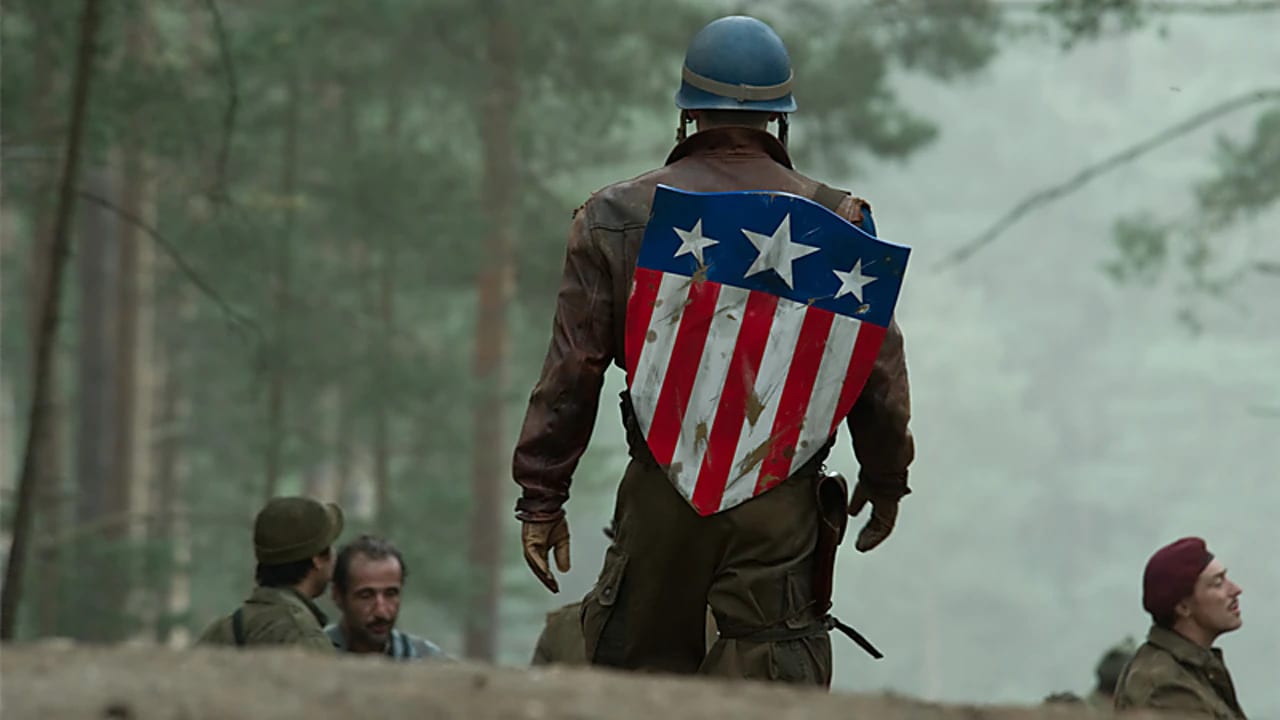“The Hero Gig”
How the Avengers Became Heroes in the MCU
Yesterday, JLongbone tweeted a video clip of Kari Skogland, who directed all six episodes of The Falcon and the Winter Soldier, talking about what kind of hero they were trying to craft in Sam Wilson’s new version of Captain America. You can see the clip below (and JLongbone is worth a follow; her live-tweets are hilarious):
excuse me, WHAT? pic.twitter.com/2tNXvNjSq4
— A.K.A. jlongb0ne (@JonsLongs) May 18, 2021
Many took umbrage with Skogland’s characterization of Sam as something other than a soldier or that it was a denigration of soldiers in general. I don’t think she was trying to say either of those things, but her description of heroism in the MCU as “being related to being a soldier and being a warrior” is wrongheaded and misses the point of what those films were saying about the nature of heroism. In fact, it was very much the opposite, especially in Phase 1, where the main Avengers were established: being a soldier or a warrior was not enough. It was about self-sacrifice, facing one’s fears, or putting oneself in danger to help others. Actually, her description of Sam as a “first responder” is apt for his predecessors, at least to an extent. We can observe this in each of the Phase 1 films (minus Iron Man 2, because it’s a sequel), specifically by pinpointing the exact moment where each Avenger became a hero.
Iron Man
“I shouldn’t be alive, unless it was for a reason.”
Iron Man spends its first 20-30 minutes establishing Tony Stark as arrogant, frivolous, impetuous, and almost childlike in his zeal to satisfy his every desire. He drinks to excess; he gambles instead of accepting an award that he quickly discards; he turns a hostile interview into a one-night stand and has his assistant dismiss his conquest when he’s done; he blows off talking about giving a speech at MIT but insists on buying a Jackson Pollack painting because it is “ridiculously overpriced;” he shows up late for an important flight – said flight being a party plane with sexy, stripping flight attendants (it’s worth pointing out that Tony Stark rocks). The film is about this guy, as presented, becoming a hero, and the focus is mostly on breaking him down while in captivity and watching him rebuild himself as he builds the Iron Man armor. He learns how to fly, how to shoot Repulsor rays and rockets, and all sorts of nifty things that look great on a theater screen.
But none of that makes him a hero. It isn’t building the suit or flying around California, or even resolving to end Stark Industries’ weapons division. The moment Tony Stark becomes a hero is when he heads back to Afghanistan to take down the terrorists who kidnapped him. He doesn’t do it out of revenge; were that the case, he’d have gone back as soon as he knew the suit’s weapons worked. For the first time, his actions have nothing to do with himself. He goes back when he sees what these monsters are doing to innocent people via a news report of them attacking and enslaving a village. He flies into a war zone to face the people who traumatized him into changing the nature of his multi-billion-dollar company and building a means of protection for himself, and he does it because people he’s never met and will never see again need his help. He even forgoes the satisfaction of dealing with one of his chief tormentors himself, instead throwing the swine to the townspeople and letting them mete out justice. This is when Tony becomes a selfless defender of the innocent and when he can truly be called a hero.
The Incredible Hulk
“It has to be me.”
If Tony spent the first quarter of Iron Man being selfish, Bruce Banner spends about three quarters of The Incredible Hulk doing everything he can not to become the monster who shares his body. Throughout his sojourn in Brazil, Bruce does all he can to keep the Hulk at bay, learning calming techniques and monitoring his heart rate to make sure he never goes green. But the one time he gets into trouble is when he sees some punks harassing a woman. This isn’t his hero moment, but it foreshadows it; Bruce Banner is desperate to avoid Hulking out, but he cannot simply walk by while someone is in trouble. (For more on this concept in the MCU, read this.) When he returns to America, it’s to find Samuel Sterns and try to eliminate the Hulk for good, finally ridding himself of the danger he poses. Banner is afraid of the Hulk, and most particularly what he’ll do as the Hulk, and he’ll do whatever it takes to erase that danger from the world and from himself.
Then, Abomination happens. When Emil Blonsky becomes a menace too powerful for anyone else to stop, Banner realizes that humanity’s only chance is the Hulk. So, in a moment of absolute selflessness, Bruce Banner not only faces his greatest fear but embraces it, choosing to become the Hulk for the first time because if he doesn’t, innocent people will die. Just like with the woman being accosted in Brazil, he cannot simply walk away. The symbolism of his jumping out of a plane without a parachute is perfect; he’s spent so much time believing that the Hulk is a monster, but he’s taking a massive risk – Betty points out that, after Sterns’ chemical tinkering, he can’t even be sure the Hulk will emerge – in hoping he can control this uncontrollable beast and save people. This is the act of a hero, a man diving into his own personal hell because the only thing worse is watching people suffer. (I talk more in-depth about this regrettably underrated movie here.)
Thor
“I mean, you’re safe.”
Thor is where Skogland’s assertion is most directly refuted. Thor begins the movie as the strongest and most skilled warrior in the Nine Realms, revered by his friends, cherished by his parents, and adored by the Asgardian people. When he travels to Jotunheim, he gleefully battles the Frost Giants on their turf and decimates scores of them; he even takes out a giant monster conjured up to destroy him. When he’s stripped of his powers and sent to Midgard, he quickly realizes that his newfound vulnerability is a test from Odin and that he must prove himself worthy of wielding Mjolnir, his enchanted hammer, and becoming the God of Thunder again. When he sees the hammer being housed in a SHIELD facility, he assumes this must be the quest and that defeating the commandos guarding his prize is how he will prove himself. (More on SHIELD’s role in Thor and the MCU as a whole can be found here.) And why wouldn’t he? For thousands of years, he’s equated being worthy with being the mightiest warrior of all.
But, as he learns after a hard-fought battle, he was wrong. Even pounding his way through a bunch of government flunkies doesn’t earn him his powers back. And after the crushing weight of his failure and some emotional manipulation from his Iagoan brother, Thor abandons all hope for the hammer, considering himself unworthy by nature and forsaken by his family. This is key because Thor does indeed prove himself worthy of Mjolnir and godhood, and it happens because he doesn’t seek it. When the Destroyer comes to Midgard and begins leveling a town looking for him, Thor lets it kill him in return for sparing the humans in its path. The god who once thought nothing of a race with strength and standing comparable to his own lays down his life to protect what would be ants to him. This is what makes Thor worthy, what restores him to his rightful place, and what makes him, at long last, a hero.
Captain America: The First Avenger
“Let’s hear it for Captain America!”
Captain America: The First Avenger presents the opposite conundrum for its lead. Thor had the strength but not the heart; Steve Rogers has all the heart in the world, but it’s trapped in a body that would blow over from a stiff breeze. When Dr. Erskine is tasked with selecting the perfect subject for the super-soldier program, he has many candidates with Thor’s original credentials, but he instead looks for the heart, for someone who can embody the spirit and the ideals of the man they want to be the symbol of American freedom. And once he gets his physical upgrade, Steve shows all the attributes one associates with a hero; he’s determined, he’s moral and true, he protects the innocent, he throws himself into harm’s way. But he’s sidelined, used as a fund-raising tool by the government while the heroism is left to the soldiers. It isn’t what he wants, but what he’s stuck with, and the experience is so demoralizing that Steve resigns himself to being “a chorus girl.”
That changes when he finds out that his best friend Bucky is missing, along with a bunch of other Allied soldiers. The war in Europe is raging, and more men can’t be spared to rescue those captured, so Bucky and the others are doomed to suffer whatever horrors Hydra inflicts on them – and that is too much for Steve Rogers to abide. With help from Peggy Carter and Howard Stark, he parachutes behind enemy lines and takes on a heavily-armed enemy base alone, knowing even with his strength that he’ll probably die. But it’s worth it to try to save lives, to do the right thing when no one else will. This is what Steve has wanted all along, to serve his country by representing the very best of it, and once he allows himself to transcend what the higher-ups made of him, he becomes that symbol by becoming a hero. And the soldiers, the real-life heroes caught up in this fantasy story, recognize that in him through his willingness to sacrifice, acknowledging the man they once mocked on stage as Captain America.
The Avengers
“This is monsters and magic and nothing we were ever trained for.”
In The Avengers, the main four are already established as heroes, and they get to show off what they’ve learned in a movie that is an exceptionally cohesive continuation of their arcs. But there are two who haven’t had the chance to become heroes yet: Black Widow and Hawkeye. These two are spies and assassins, built and regularly dispatched to kill for their government (two governments, in Natasha’s case). In the first half of the movie, they’re more opposed to the big guns than aligned with them; Loki brainwashes Hawkeye into doing his bidding, and Natasha helps SHIELD corral the good guys, whether they want to be or not. Now, they’re in over their heads even more than the others, up to their elbows in the supernatural and the scientifically fictional, wondering what a Glock and bow and arrow can do to stop an alien army led by a Norse God.
They have to try, though, and it’s through their interactions with the big villain that they realize it. Loki has manipulated both of them, mystically with Clint and through his words with Natasha. Clint has been forced to betray everything he believes in and work to foment evil. And Natasha, even though she was able to turn the tables on Loki, was faced with the victims of her past as a Russian agent, the red in her ledger. They’ve both got a lot to make up for, and their tormentor has given them the drive to do it. But to do so now is essentially a suicide mission, and it isn’t easy for people who spent their lives prioritizing their own safety – killing from afar, or at least with a good exit strategy – to stand on the frontlines of a war they can’t hope to win. When they resolve to do just that is when they become heroes, abandoning their every instinct and tendency toward self-preservation because they need to do good. And once they’re finally on the ground, they help to save people with the others, at one point pulling passengers from a trapped bus. This is who they are now, and once bitten by the hero bug, there’s no going back for either of them.
***
There are more examples later on, but the point is that heroism being about saving people and risking one’s life or even sacrificing it, was always in the MCU’s DNA. It was more consistent back then as well. The best moments in the finale of The Falcon and the Winter Soldier feature Sam, Bucky, and John Walker rescuing people, in Walker’s sacrificing his own selfish desires to do so. The worst ones have Sam getting on a soapbox to lecture people about open borders and how “a black man is Captain America” (which should be the name of whatever his next appearance is since it seems to be all they think is important about him). When you start making things like race and gender the defining characteristics of your heroes, you dilute the nature of heroism, breaking a strong foundation instead of building on it. And if that’s what they want to do now, so be it, but it would be nice if they had a better understanding of what laid the groundwork for all these “risks” they’re taking.
Comments (2)

That was nice, and it dovetails off of Captain America doing that in Endgame.








One thing I liked about Falcon, Captain America and Winter Soldier are those group sessions where they try to rehabilitate veterans back into society. As counselors, it was like a small heroic thing to do, which was, join a support group. It’s an issue in itself. How to bring soldiers back to normal life after all the trauma they’ve experienced. One of the little things that made what they did special in these movies and shows.